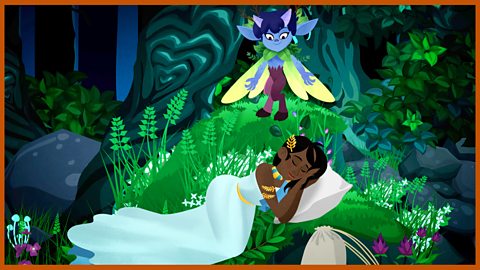We meet Puck - our storyteller - and learn about the impending marriage of Duke Theseus and Queen Hippolyta.
SCENE 1: THE WOODS OUTSIDE ATHENS
PUCK: Hello everyone, gather round and let me introduce myself. I am a merry wanderer of the night. Some call me Hobgoblin, but I prefer Puck. I work for my master Oberon and make sure he has good luck. But Iãll tell you a bit more about him laterãÎ I need to let you know whatãs happening in Athens first. Are you ready to see some magic? ShalakazooãÎ Woops! Letãs try againãÎ Mnnn-ha!
SCENE 2: THE CITY OF ATHENS
PUCK: Welcome to Athens! A city all in a flutterãÎ Because in just four days, the noble Duke Theseus is marrying the warrior Queen Hippolyta. Most people are excited, but others are feeling stressed, like the young lady Hermia ã whoãs in a proper mess. Hermiaãs dad, Egeus, wants her to marry Demetrius. But Hermiaãs in love with another, who goes by the name ofLysander. Egeus isnãt happy ã a daughter should respect her father, so off he goes to Theseus to try to sort out the bother. ãPut duty over desire,ã says the lord of the land; ãfit your fancies to your fatherãs will; itãs what the law demands. Take four days to think it over,ã says the Duke to the young lover, ãbut upon our wedding day, be ready to do as we say.ã
SCENE 3: HERMIAãS HOUSE, ATHENS
PUCK: Poor Hermia! Letãs see how sheãs doing. Donãt mind me, Iãm just going to wait up here. Donãt worry, they canãt see me. Here she comes!
LYSANDER: O Hermia! Why is your cheek so pale?
HERMIA: Lysander, itãs so unfair. To have to choose my love by my fatherãs eyesãÎ
LYSANDER: The course of true love never did run smoothãÎ
HERMIA: But couldnãt it run a little less bumpy?
LYSANDER: Hear me, Hermia, I have an idea. We should get out of this city and head for the far side of the woods where Athenian law doesnãt reach. And instead of marrying Demetrius, you can marry me! Tomorrow night Iãll wait for you in the woods and weãll travel together, if youãll have me?
HERMIA: My good Lysander, I swear to you by Cupidãs strongest bow that Iãll meet you tomorrow in the wood.
PUCK: Ahh! The best-laid plans of young loversãÎ
HELENA: Oh woeãÎ
PUCK: Whoãs this now?
HELENA: Oh woe, woe, woe, woe, woe, woe, woeãÎ
PUCK: Thatãs Hermiaãs friend Helena, and sheãs not happyãÎ
HERMIA: Fair Helena!
HELENA: You call me fair? That fair again unsay. Demetrius loves your fair. Ah, why canãt I look like you? Why canãt I sound like you? Why canãt I be you? O, teach me how to make Demetrius love me like he loves you.
HERMIA: I frown at him, yet he loves me still.
HELENA: O that you could teach me that skill!
HERMIA: Helena, honestly, the more I hate him, the more he follows me.
HELENA: The more I love him, the more he hates me.
HERMIA: Take comfort Helena. Demetrius is no more going to see my face, because Lysander and I are planning to flee this place.
HELENA: What?!
HERMIA: Shh! Tomorrow nightãÎ
LYSANDER: When itãs dark and nobody can see usãÎ
HERMIA: Weãre going to sneak out of Athensã gates.
HELENA: Youãre running away?
HERMIA: Itãs the only way for us to be together. You understand donãt you?
HELENA: IãÎ IãÎ
HERMIA: Farewell, dear Helena, pray for us. Be safe Lysander and hide from my sight. I wonãt see you ãtil tomorrow when we flee at midnight.
LYSANDER: Farewell my Hermia. Helena adieu; as you dote on him, I hope Demetrius will now start to dote on you.
HELENA: Ugh! Why should Hermia be so much happier than me? Through Athens I am thought as fair as she. But what of that? Demetrius doesnãt think so. He used to love me, but then he changed his mind. And since he started to fancy Hermia heãs been really, really unkind. I will go and tell him of Hermia and Lysanderãs plan and maybe then heãll thank me for sharing their secret and start to be a kinder man?
PUCK: So, it looks like Lysander and Hermiaãs secret plan isnãt so secret any more. When they meet by moonlight tomorrow, something tells me Demetrius and Helena wonãt be far behind.
FX: Puck flies off
1: Welcome to Athens
Puck - a woodland sprite - relates recent events in Athens: Theseus, the Duke, is preparing to marry Queen Hippolyta. Meanwhile Egeus wants his daughter, Hermia, to marry Demetrius. But Hermia only has eyes for her true love, Lysander.
Egeus takes Hermia to Theseus and he rules in her fatherãs favour: Hermia must marry Demetrius. So Hermia and Lysander make a plan to escape the city through the woods to be married beyond the reach of Athenian law.
The lovers reveal their plan to Hermiaãs friend Helena, who is herself unhappily in love with Demetrius. Helena decides to tell Demetrius about it in the hope of winning his favour.
Meet the characters
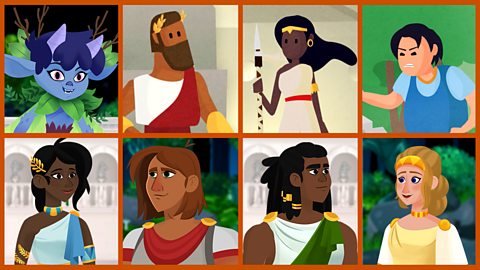
Image caption, Scroll through the gallery of characters
1 of 8
Meet more characters
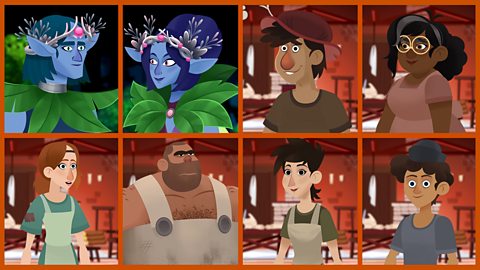
Image caption, Scroll through the gallery of remaining characters
1 of 9
Download / print transcript of Episode 1
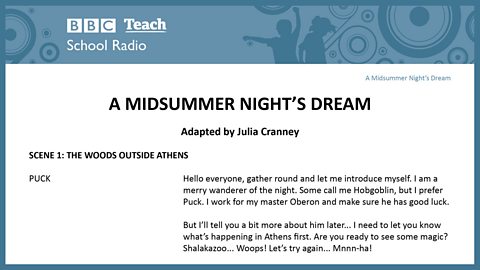
Activities - KS2
To get to know the characters in the play better pupils could match their names to their illustrations on the , then arrange characters into pairs / groups according to their different relationships - eg:
- which characters live at court / which characters live in the town / the wood?
- who is in love with who?
- who wants Lysander and Hermia to be together?
- who wants Demetrius and Hermia to be together?
A discussion / creative writing exercise could ask students to describe the activity and excitement in Athens preceding Theseus and Hippolytaãs wedding.
Helenaãs famous ãHow happy some oãer other some can be!ã speech (Act 1, Scene 1, lines 236-262) could be given to pupils in its original form. They could be asked to identify the rhymes and discuss the meaning of lines like ãlove looks not with the eyes but with the mind.ã
HELENA
How happy some o'er other some can be!
Through Athens I am thought as fair as she.
But what of that? Demetrius thinks not so.
He will not know what all but he do know.
And as he errs, doting on Hermiaãs eyes,
So I, admiring of his qualities.
Things base and vile, holding no quantity,
Love can transpose to form and dignity.
Love looks not with the eyes but with the mind.
And therefore is winged Cupid painted blind.
Nor hath Loveãs mind of any judgment taste ã
Wings and no eyes figure unheedy haste.
And therefore is Love said to be a child,
Because in choice he is so oft beguiled.
As waggish boys in game themselves forswear,
So the boy Love is perjured everywhere.
For ere Demetrius looked on Hermiaãs eyne,
He hailed down oaths that he was only mine.
Activities - KS3
Pupils could be presented with a list of adjectives related to the main characters (eg ãcheekyã, ãdreamerã, ãlovingã, ãromanticã) and asked, in groups, to use a Thesaurus to come up with a word bank of additional adjectives. They could then link the adjectives to the characters and construct new sentences with them.
Pupils could be asked to analyse an excerpt from the original, in which Theseus talks to Hermia about her filial duty to her father (Act 1, Scene 1, lines 46-90) and explore Hermiaãs feelings, providing evidence from the text.
THESEUS
What say you, Hermia? Be advised, fair maid:
To you your father should be as a god,
One that composed your beauties, yea, and one
To whom you are but as a form in wax,
By him imprinted and within his power
To leave the figure or disfigure it.
Demetrius is a worthy gentleman.
HERMIA
So is Lysander.
THESEUS
In himself he is;
But in this kind, wanting your fatherãs voice,
The other must be held the worthier.
HERMIA
I would my father lookãd but with my eyes.
THESEUS
Rather your eyes must with his judgment look.
HERMIA
I do entreat your Grace to pardon me.
I know not by what power I am made bold,
Nor how it may concern my modesty,
In such a presence here to plead my thoughts;
But I beseech your Grace that I may know
The worst that may befall me in this case,
If I refuse to wed Demetrius.
THESEUS
Either to die the death, or to abjure
Forever the society of men.
Therefore, fair Hermia, question your desires,
Know of your youth, examine well your blood,
Whether (if you yield not to your fatherãs choice)
You can endure the livery of a nun,
For aye to be in shady cloister mewãd,
To live a barren sister all your life,
Chanting faint hymns to the cold fruitless moon.
Thrice blessed they that master so their blood
To undergo such maiden pilgrimage;
But earthlier happy is the rose distillãd,
Than that which withering on the virgin thorn
Grows, lives, and dies in single blessedness.
HERMIA
So will I grow, so live, so die, my lord,
Ere I will yield my virgin patent up
Unto his lordship, whose unwished yoke
My soul consents not to give sovereignty.
THESEUS
Take time to pause, and by the next new moon ã
The sealing-day betwixt my love and me
For everlasting bond of fellowship ã
Upon that day either prepare to die
For disobedience to your fatherãs will,
Or else to wed Demetrius, as he would,
Or on Dianaãs altar to protest
For aye austerity and single life.
More episodes from A Midsummer Night's Dream
Quince gathers her troupe of amateur actors including Nick Bottom, the weaver.
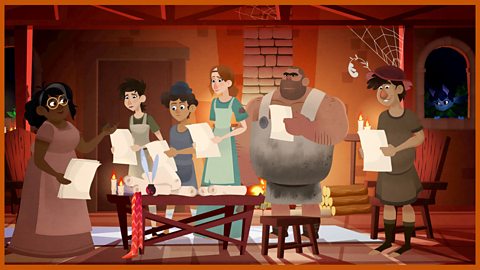
Oberon and Titania argue...and Puck is instructed to find a magic flower.
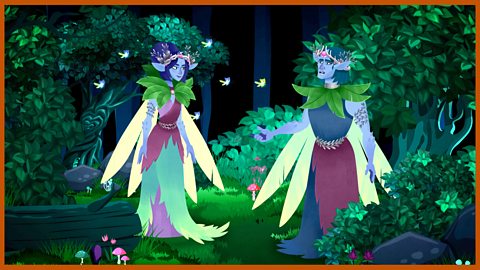
Oberon uses the magic flower on Titania...but Puck uses it on the wrong Athenian.
